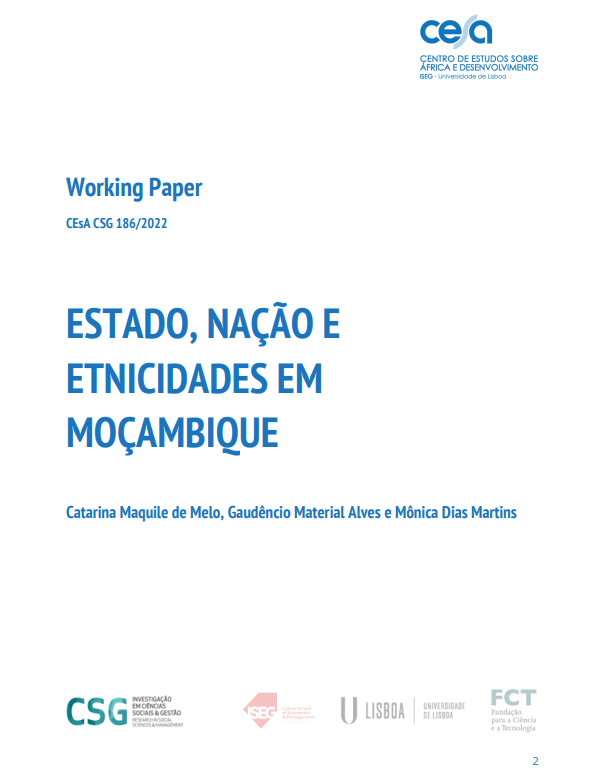Working Paper 186/2022: Estado, Nação e Etnicidades em Moçambique

Title: Working Paper 186/2022: Estado, Nação e Etnicidades em Moçambique
Author(s): Melo, Catarina Maquile de; Alves, Gaudêncio Material; Martins, Mônica Dias
Publication Date: 2022
Publisher: ISEG - CEsA
Quotation: De Melo, C. M., Material Alves, G. e Martins, M. D. (2022). “Estado, Nação e Etnicidades em Moçambique”. CEsA/CSG/ISEG/ULisboa - Documentos de Trabalho nº 186/2022
Abstract: The article analyses the process of State-building and Nation-building in Mozambique, whose population is characterised by ethnic diversity. The first section presents a reflection on the foundations, the main actors and the actions towards the formation of the nation-state. In the second, we discuss the relationship between nationalism and socialist ideology, the latter interpreted in the post-independence period as the only path that would lead to development and to a society free from exploitation. With the 1990 constitution, a new order of political and economic liberalisation came into force. We seek to critically examine the political process underway in the country, in defiance of the dominant conceptions in the media, government, business and academic circles. To this end, we rely on bibliographic research and official documents, in addition to the experiences of two scholars who develop work in Quelimane, capital of Zambézia province in central Mozambique.
Identifier: http://hdl.handle.net/10400.5/26272
Category: Working paper
Abstract:
The processes of state and nation building begin soon after independence and establish a link between them, although each has its own logic. While the nation refers to collective identity, the State refers to the existence of a central-level political authority, respected throughout the territory. As evidenced during the text, a significant part of the State structure that emerged after national independence was the result of the Portuguese colonial legacy, idealized by FRELIMO’s ruling elite and implemented as a project of formation of the “New Man”, which occurred in an imperative way and through uniformizing policies. Estado, Nação e Etnicidades em Moçambique analyses the process of State and Nation building in Mozambique, whose population is characterised by a diversity of ethnicities. The first section presents a reflection on the foundations, the main actors and the actions towards the formation of the nation-state. In the second, we discuss the relationship between nationalism and socialist ideology, the latter interpreted in the post-independence period as the only path that would lead to development and to a society free from exploitation. With the 1990 constitution, a new order of political and economic liberalisation came into force. We seek to critically examine the political process underway in the country, in defiance of the dominant conceptions in the media, government, business and academic circles. To this end, we rely on bibliographic research and official documents, in addition to the experiences of two scholars who develop work in Quelimane, capital of Zambézia province in central Mozambique.
Quotation:
De Melo, C. M., Material Alves, G. e Martins, M. D. (2022). “Estado, Nação e Etnicidades em Moçambique”. CEsA/CSG/ISEG/ULisboa – Documentos de Trabalho nº 186/2022





